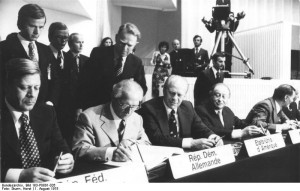By Raymond A. Smith, Adjunct Assistant Professor of Political Science at Columbia and NYU
___________________________________________________________________________
The signing of the Helsinki Accords on August 1, 1975 has little of the resonance today of such landmark events of the Cold War as the fall of the Berlin Wall in 1989, the rise of the Solidarity Trade Union Movement in 1981, or of the uprisings in Czechoslovakia in 1968 and Hungary in 1956. Yet on their fortieth anniversary, the Helsinki Accords deserve to be remembered alongside those events. And, in some ways, they have even more enduring relevance for world order and for human rights.

The Helsinki Accords had their roots in the refusal of the US and its allies to accept the legality of the new borders and regimes imposed by the Soviet Red Army when it occupied the three Baltic states and six countries in Eastern Europe. American rhetoric in the early Cold War often referred to these as “captive nations” that were suffering under a Communist system that they had not chosen. Conversely, Soviet rhetoric sought ways to validate what they viewed as their hard-won geographic sphere of influence.
By the mid-1970s, however, in an atmosphere of East-West détente, some three dozen countries began an intensive multi-year process of negotiations intended to stabilize Europe and strengthen international cooperation. The ultimate product was the “Final Act of the Conference on Security and Cooperation in Europe,” which is today better recalled by the name of the Finnish capital where the talks took place.
The Helsinki Accords were loosely organized into four distinct “baskets” of issues, but the Soviets were mostly concerned about the “first basket” of security-related issues. Through these, the signatories agreed to uphold the inviolability of post- WWII borders and the integrity of existing sovereign territories within Europe. Soviet leaders believed these provisions would ratify and legitimize their grip on Eastern Europe. Many American conservatives agreed, deeming the Accords an appeasement by the West and criticizing President Gerald Ford’s decision to sign them.
However, the first basket ended up doing little more than acknowledging a post-WWII European order that had long been a fait accompli. Unexpectedly, it was the lesser-noted “third basket” on human rights that has had the most enduring impact. Most crucial was the 7th principle of the Accords which, rooted in the Universal Declaration of Human Rights, called for “respect for human rights and fundamental freedoms, including the freedom of thought, conscience, religion or belief.”
To the Soviets, this promise of individual rights seemed a minor concession when compared to the ratification of existing boundaries. In any case, Communist regimes considered individual rights as something always to be mediated by the state, and therefore entirely under the control of their regimes. Overall, they considered the Accords to be a diplomatic triumph, and had them widely extolled throughout state-controlled media, even printing their full text in societies that otherwise tightly controlled information.
Thus, Soviet bloc leaders were caught entirely off guard when a new generation of dissidents took the 7th principle of the Accords far more seriously—and demanded that their governments do the same. The next year, in 1976 in Moscow, leading Russian liberal dissident Andre Sakharov founded a “Helsinki Group” to insist that the Soviet Union live up to its now-stated commitment to “respect for human rights and fundamental freedoms.”
Soon thereafter, Charter 77 was established for similar purposes in Prague, which was led by playwright Vaclav Havel, who would 12 years later become his nation’s first post-Communist president. In 1978, a global organization called “Helsinki Watch” was founded to monitor implementation of the Accords in Europe. Ultimately, Helsinki Watch spawned parallel “watches” for the Americas, Middle East, Africa, and Asia—and then evolved into one of today’s preeminent international NGOs, Human Rights Watch.
 At the intergovernmental level, the Accords established a “Helsinki process” that became institutionalized through an ongoing Organization for Security and Cooperation in Europe (OSCE). A series of follow-up meetings afforded high-profile platforms for activists to present documentation of human rights abuses. The Soviet bloc countries weakly refuted such claims, but were forced to remain engaged in the Helsinki process in order to maintain their gains concerning recognition of existing borders. To add to the pressure for compliance, the U.S. Congress established a U.S. Helsinki Commission, which still functions today composed of commissioners from the House, Senate, and Departments of State, Defense, and Commerce.
At the intergovernmental level, the Accords established a “Helsinki process” that became institutionalized through an ongoing Organization for Security and Cooperation in Europe (OSCE). A series of follow-up meetings afforded high-profile platforms for activists to present documentation of human rights abuses. The Soviet bloc countries weakly refuted such claims, but were forced to remain engaged in the Helsinki process in order to maintain their gains concerning recognition of existing borders. To add to the pressure for compliance, the U.S. Congress established a U.S. Helsinki Commission, which still functions today composed of commissioners from the House, Senate, and Departments of State, Defense, and Commerce.
Ultimately, argues Daniel C. Thomas in his 2001 book The Helsinki Effect, the “Helsinki Final Act’s formal commitment to respect human rights contributed significantly to the demise of Communism and the end of the Cold War…[which] surprised the diplomats who negotiated it, the politicians who signed it, and many others who had rushed to criticize it as a concession to dictatorship.” In a book published in 2011 on Human Rights Activism and the End of the Cold War, Sarah B. Snyder further documents how the Helsinki process went about “unifying Soviet domestic opposition, offering incentives for change in Eastern Europe, creating a means for human rights activists to advance their agenda on an international stage, and facilitate the transition to a new Europe.”
Forty years later, the Accords have begun to be cited again in the context of the Russian annexation of Crimea and other illegal interventions in Ukraine, Georgia, and Moldova. Ironically, such territorial incursions are the clearest violations since at least 1975 of the very principles of territorial integrity and inviolability of boundaries that the Soviet Union had fought for so assiduously as part of the Helsinki process.
For those focused on human rights, the anniversary of the Helsinki Accords should not be an occasion for triumphalism, given the persistent violation of basic human rights norms around the world. But the Accords nevertheless are well worth remembering as a sort of slow-motion triumph for painstaking multilateral engagement, for the increasing relevance of both grassroots activists and transnational human rights NGOs, and most of all, for the empowerment of average individuals to demand their human rights.
Reference: The Final Act of the Conference on Security and Cooperation in Europe, August 1, 1975, 14 I.L.M. 1292
Raymond A. Smith, Ph.D. (GSAS 1999), is an Adjunct Assistant Professor of Political Science at Columbia and at NYU and is a Senior Fellow with the Progressive Policy Institute.

I found this well written account on the 45th anniversary of the Accords in 2020. While the HR situation in Russia has been deteriorating under Putin it is good to be reminded of what was an undeniable if unexpected success for HR.